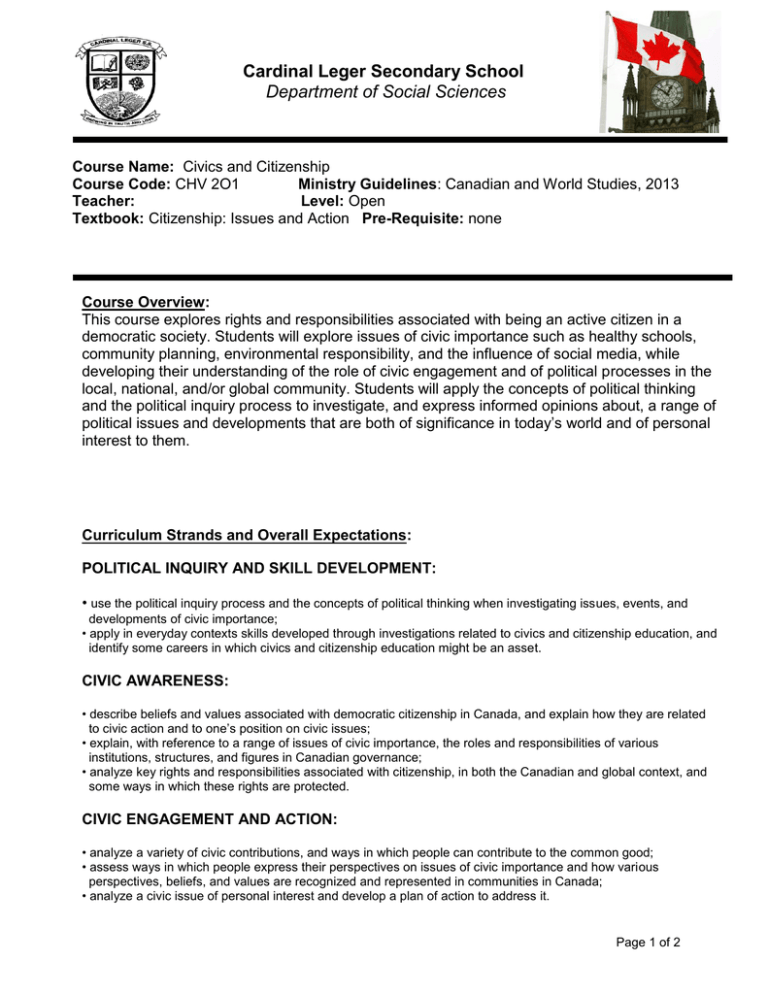Cardinal Leger Secondary School Department of Social Sciences
advertisement

Cardinal Leger Secondary School Department of Social Sciences Course Name: Civics and Citizenship Course Code: CHV 2O1 Ministry Guidelines: Canadian and World Studies, 2013 Teacher: Level: Open Textbook: Citizenship: Issues and Action Pre-Requisite: none Course Overview: This course explores rights and responsibilities associated with being an active citizen in a democratic society. Students will explore issues of civic importance such as healthy schools, community planning, environmental responsibility, and the influence of social media, while developing their understanding of the role of civic engagement and of political processes in the local, national, and/or global community. Students will apply the concepts of political thinking and the political inquiry process to investigate, and express informed opinions about, a range of political issues and developments that are both of significance in today’s world and of personal interest to them. Curriculum Strands and Overall Expectations: POLITICAL INQUIRY AND SKILL DEVELOPMENT: • use the political inquiry process and the concepts of political thinking when investigating issues, events, and developments of civic importance; • apply in everyday contexts skills developed through investigations related to civics and citizenship education, and identify some careers in which civics and citizenship education might be an asset. CIVIC AWARENESS: • describe beliefs and values associated with democratic citizenship in Canada, and explain how they are related to civic action and to one’s position on civic issues; • explain, with reference to a range of issues of civic importance, the roles and responsibilities of various institutions, structures, and figures in Canadian governance; • analyze key rights and responsibilities associated with citizenship, in both the Canadian and global context, and some ways in which these rights are protected. CIVIC ENGAGEMENT AND ACTION: • analyze a variety of civic contributions, and ways in which people can contribute to the common good; • assess ways in which people express their perspectives on issues of civic importance and how various perspectives, beliefs, and values are recognized and represented in communities in Canada; • analyze a civic issue of personal interest and develop a plan of action to address it. Page 1 of 2 Cardinal Leger Secondary School Department of Social Sciences Evaluation: Term Work: Will consist of tests, quizzes, assignments and class work. Term Work 70% Knowledge and Understanding 25% Thinking 25% Communication 25% Application 25% Final Assessment 30% Formal Examination 15% Culminating Task 15% Course Total 100% Learning Skills and Work Habits Responsibility Organization Independent Work Collaboration Initiative Self-Regulation E= Excellent G=Good S=Satisfactory N= Needs Improvement Fulfills responsibility and commitments. Takes responsibility for and manages own behavior. Devises and follows a plan and process for completing tasks. Establishes priorities and manages time Independently monitors, assesses, and revises plans to complete tasks and meet goals. Uses class time to complete tasks. Accepts various roles and an equitable share of work in a group. Builds healthy peer-to-peer relationships. Looks for and acts on new ideas and opportunities. Approaches new tasks with a positive attitude. Sets own goals and monitors progress towards achieving them. Seeks clarification or assistance when needed. Missed/Late/Incomplete Assignments It is the student’s responsibility to address missed, late, or incomplete assignments. Students are expected to complete assignments and to adhere to assignment deadlines as follows: Due Date A due date is set by the teacher. 10% Penalty Zone 1 school day late – 3% 2 school days late – 6% 3 school days late – 10% Maximum penalty of 10% Closure Date Once the closure date has passed, work is considered incomplete and a mark of zero applies. Parent Signature: _______________________ Student Signature: ______________________ Page 2 of 2



